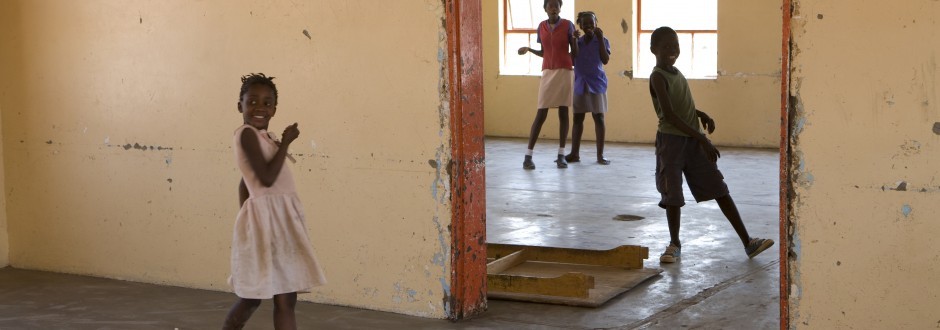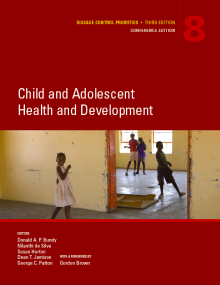
Copyright: © John Hogg/World Bank. Further permission required for reuse
Foreword by Gordon Brown

HEALTH AND EDUCATION DURING THE 8,000 DAYS OF CHILD AND ADOLESCENT DEVELOPMENT: TWO SIDES OF THE SAME COIN
Today, there is comfort to be found in returning to the inspired words of others. Until H. G. Wells’ time machine is made, words are our emotional anchor to the past and, one hopes, our window to a brighter future. Speaking before the 18th General Assembly of the United Nations in 1963, it was President John F. Kennedy who noted that the “effort to improve the conditions of man, however, is not a task for the few.” Development is a shared, cross-cutting mission I know well. For the breakthroughs we witness—from Borlaug’s wheat to a vaccine for polio—are the products of cooperation, a clean break from siloed thinking, and a courage to work at the sharp edges of disciplines.
Working as a lecturer for five years in the 1970s and early 1980s, I came to see—in a way I never had as a student—that education unlocks talent and unleashes potential. And as Chancellor, Prime Minister, and most importantly a parent, education has remained a centerpiece in my life because of the hope it delivers. For when we ask ourselves what breaks the weak, it is not the Mediterranean wave that submerges the life vest, nor the food convoy that does not make it to the besieged Syrian town. Rather, it is the absence of hope, the soul-crushing certainty that there is nothing ahead to plan or prepare for—not even a place in school.
Two years ago, the International Commission on Financing Global Education Opportunity, composed of two dozen global leaders and convened by the Prime Minister of Norway and the Presidents of Chile, Indonesia, and Malawi, as well as the Director-General of UNESCO, set out to make a new investment case for global education. What resulted was a credible yet ambitious plan capable of ensuring that the Sustainable Development Goal of an inclusive and quality education for all is met by the 2030 deadline. While we continue to work today to ensure our messages become action— from increased domestic spending on schooling to an International Finance Facility for Education—we sought to produce an authoritative, technically strong report that would spend more time being open on desks than collecting dust on a shelf.
The Disease Control Priorities (DCP) series established in 1993 shares this philosophy and acts as a key resource for Ministers of Health and Finance, guiding them toward informed decisions about investing in health. The third edition of DCP rightly recognizes that good health is but one facet of human development and that health and education outcomes are forever intertwined. The Commission report makes clear that more education equates with better health outcomes. And approaching this reality from the other direction, this year’s volume of DCP shows that children who are in good health and appropriately nourished are more likely to participate in school and to learn while there. The Commission report raises the concept of progressive universalism or giving greatest priority to those children most at risk of being excluded from learning. Here, too, the alignment with DCP is clear as health strides are most apparent when directed to the poorest and sickest children, as well as girls.
It is fitting that one of the Commission’s background papers appears as a chapter in this volume. The Commission showed that education spending, particularly for adolescent girls, is a moral imperative and an economic necessity. Indeed, girls are the least likely to go to primary school, the least likely to enter or complete secondary school, highly unlikely to matriculate to college, and the most likely to be married at a young age, to be forced into domestic service or trafficked. And with uneducated girls bearing five children against two children for educated girls, the vicious cycle of illiterate girls, high birth rates, low national incomes per head, and migration in search of opportunity will only worsen so long as we fail to deliver that most fundamental right to an education.
Here is a projection to remember. If current education funding trends hold, by 2030, 800 million children—half a generation—will lack the basic secondary skills necessary to thrive in an unknowable future. In calling for more and better results-based education spending, the Commission estimated that current total annual education expenditure is US$1.3 trillion across low- and middle-income countries, an anemic sum that must steadily rise to US$3 trillion by 2030. A rising tide must lift all ships, and so as education spending at the domestic and international levels sees an uptick, the same must be witnessed for health. The numbers may seem large, but the reality is that this relatively inexpensive effort would do more than unlock better health and education outcomes; it would bring us closer to achieving all 17 Sustainable Development Goals and unlocking the next stage of global growth.
A key message of this volume is that human development is a slow process; it takes two decades— 8,000 days—for a human to develop physically and mentally. We also know a proper education requires time. So the world needs to invest widely, deeply, and effectively— across education, health, and all development sectors—during childhood and adolescence. And while individuals may have 8,000 days to develop, we must mobilize our resources today to secure their tomorrow. Let us not forget that the current generation of young people will transition to adulthood in 2030, and it will be their contribution that will determine whether the world achieves the Sustainable Development Goals. We have, to again draw on Kennedy’s words, “the capacity to control [our] environment, to end thirst and hunger, to conquer poverty and disease, to banish illiteracy and massive human misery.” We have this capacity, but only when we work together. Both the Commission report and this latest Disease Control Priorities volume seek to elevate cross-sector initiatives on the global agenda. In human development, health and education are two sides of the same coin: only when we speak as one will this call be heard.
Gordon Brown
United Nations Special Envoy for Global Education
Chair of the International Commission on
Financing Global Education Opportunity
Prime Minister of the United Kingdom, 2007–2010
Chancellor of the Exchequer, 1997–2007

